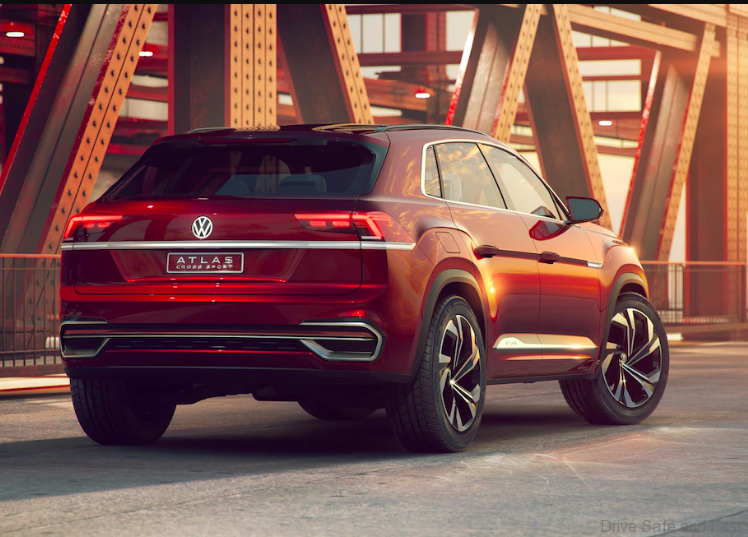Volkswagen Atlas confirmed as part of a global SUV offensive initiated by VW under the title “Moving Forward”.
The Atlas Cross Sport is being positioned as a more affordable alternative to the likes of the BMW X6 and Jaguar F-Pace. As with the Atlas SUV on sale since early 2017, the new model is based on Volkswagen’s MQB (Modularen Querbau – modular transverse architecture) platform.
Stylistically, the new Atlas Cross Sport concept closely resembles its more practical sibling but with some subtle styling changes that serve to provide it with a more sporting appearance, most notably at the rear.
Up front, the new five-seat SUV sports a bold grille featuring full width LED light bands and illuminated badge that act as day time running lamps to help accentuate its width. It also receives a more structured front bumper than its seven-seat sibling, with the lower section featuring a wide central air duct and large outer air ducts intersected by matt aluminium highlights.
Further back, the Atlas Cross Sport adopts a contoured bonnet, prominent wheel arches filled with 22-inch wheels shod with 285/45 tires as well as a heavily raked windscreen and structured flanks with a deeply etched swage line along the deep doors.
The main departure between the two Volkswagen SUV models is evident at the rear; the Atlas Cross Sport receives a more heavily plunging roofline than the existing Atlas SUV. It also sports a shallower glasshouse and racier C-pillar styling than its more practical sibling.
The rear, meanwhile, is dominated by a pair of high set LED tail lamps as well as a large tailgate featuring an aerodynamic enhancing spoiler above the rear window and a full width LED light band that wraps around into the rear fenders.
With a length of 4847mm, width of 2030mm and height of 1736mm, the Atlas Cross Sport is 190mm shorter, 41mm wider and 42mm lower than the existing Atlas SUV, with which the new Volkswagen model shares its 2980mm wheelbase.
Also a new plug-in hybrid powertrain from VW uses a 3.6-litre V6 petrol engine developing 206kW and 350Nm of torque in combination with two electric motors – one mounted at the front developing 40kW and 220Nm and another at the rear with 85kW and 270Nm. Together, the three power sources provide the Atlas Cross Sport PHEV with a combined system output of 265kW and 670Nm.
The petrol engine and front electric motor provide drive to the front wheels via a 6-speed dual clutch gearbox, while the rear electric motor powers the rear wheels, endowing the new Volkswagen models with four-wheel drive capability.
The driver can choose between four modes: e-mode for all-electric propulsion, hybrid with a combination the gasoline engine supporting the electric motors, GTE offering maximum performance and Battery Hold in which the energy content of the battery remains at a constant level. There are also seven different driving profiles: on-road with either comfort and eco, off-road with rocks, sludge and gravel as well as separate sport and snow programs.
Volkswagen has not revealed a curb weight figure for the new model. However, official performance claims point to a 0-100km/h time of 5.7sec and limited 209km/h top speed.
Energy used to power the electric motors is stowed in an 18.0kWh lithium-ion battery mounted within the floor of the luggage compartment. It is claimed to provide an all-electric range of up to 70km on the New European Driving Cycle test procedure. Total range is put at possible 1000km.






